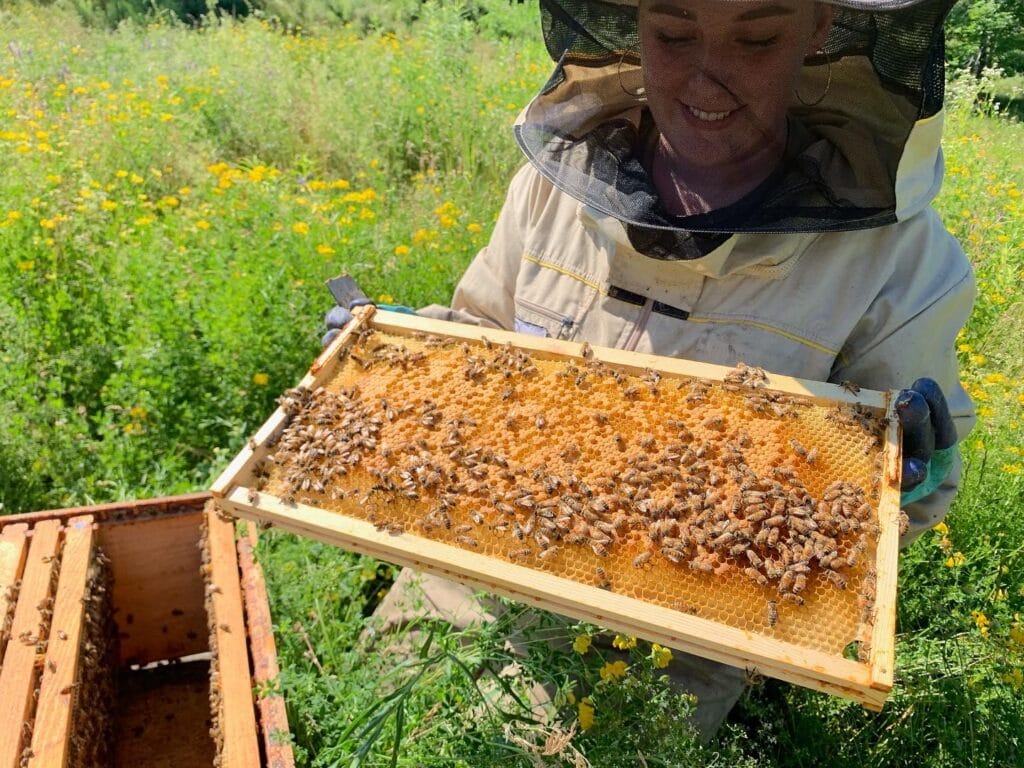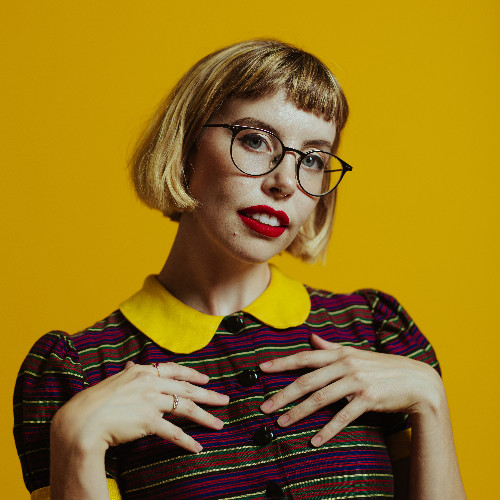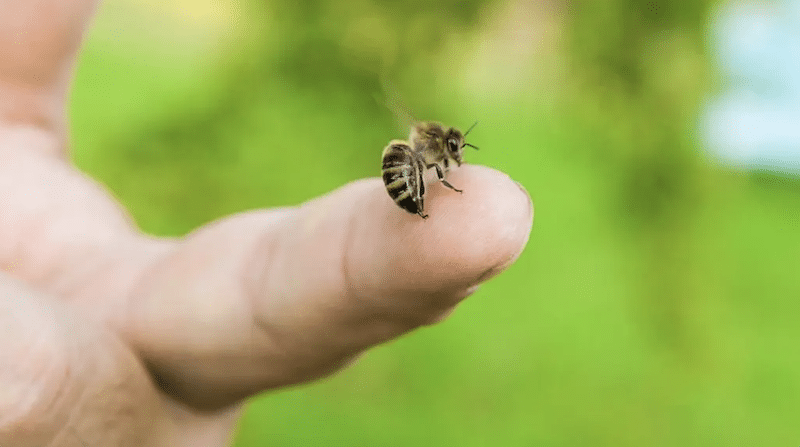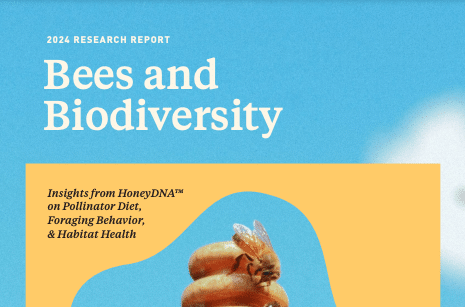At one time, a beekeeper can be surrounded by at least 20,000 bees. Now, multiply that by at least 12 and you can get a sense of a typical day for our Apiary Manager, Jordan–and she wouldn’t have it any other way.
Jordan has been caring for the bees at our apiaries here in Boston for one year, and we’re so grateful to have her knowledge and expertise on our team. Keep reading for the latest chat in the Next-Gen Beekeeper series where we learned about Jordan’s role as an Apiary Manager, the emotional and spiritual connection she has developed with the bees she cares for, and how her journey all started with purple honey.
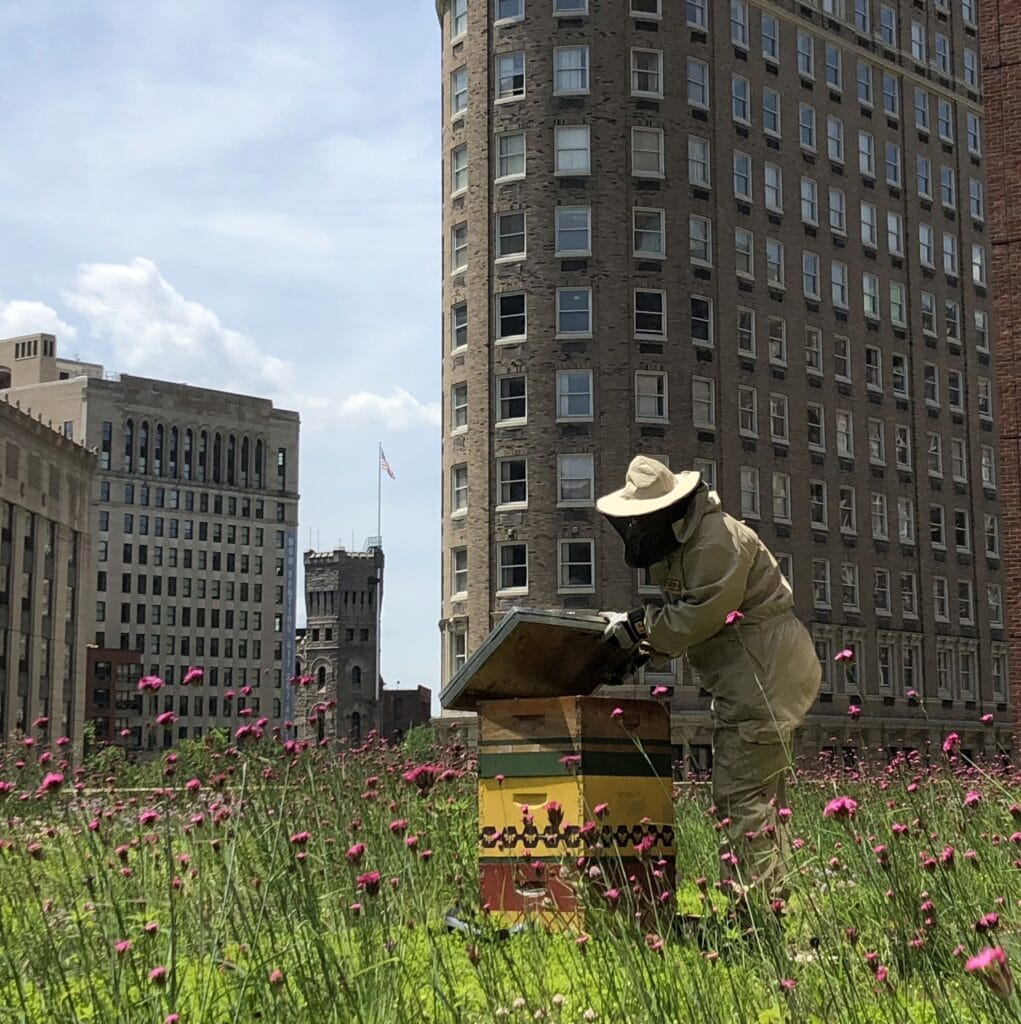
What’s your name?
Jordan Walker
What are your preferred pronouns?
She/Her
Where are you from?
I’m from Holden, Massachusetts, which is in the center of Massachusetts by Worchester.
What’s your title at Best Bees?
I am the Apiary Manager.
How did you first get into beekeeping? What did that journey look like for you?
The first time I was ever really exposed to beekeeping was as a kid. My next-door neighbor had a hive in between our houses and she brought over some purple-ish honey one time, and I was like, “Wow, this is amazing”.
Apparently, she had some of these hibiscus flowers, and I don’t know if she infused it or if it was from the bees pollinating them and turning the honey purple, but ever since then, I was just really fascinated with bees. I’ve always loved bugs, but when I got to high school, the Save the Bees movement really started happening.
We heard that this fascination even carried into your studies in college?
Yes! When I got to college, I studied industrial design and during my senior year, I had to pick a thesis and I really wanted to choose something that was going to be impactful for humans, but also for the environment. So I decided to focus on beekeeping, and I wanted to design a new system to make it easier for beginner beekeepers to get into beekeeping.
So from there, I spent three to four months doing research on bees, beekeeping, the equipment, and the kinds of people who keep bees. And then I identified some problems within that whole realm, and for four months after that, I designed a whole new system. So, starting with the tools, the suit, the smoker, and even a way to communicate with expert beekeepers and to get some feedback on how to improve those practices.
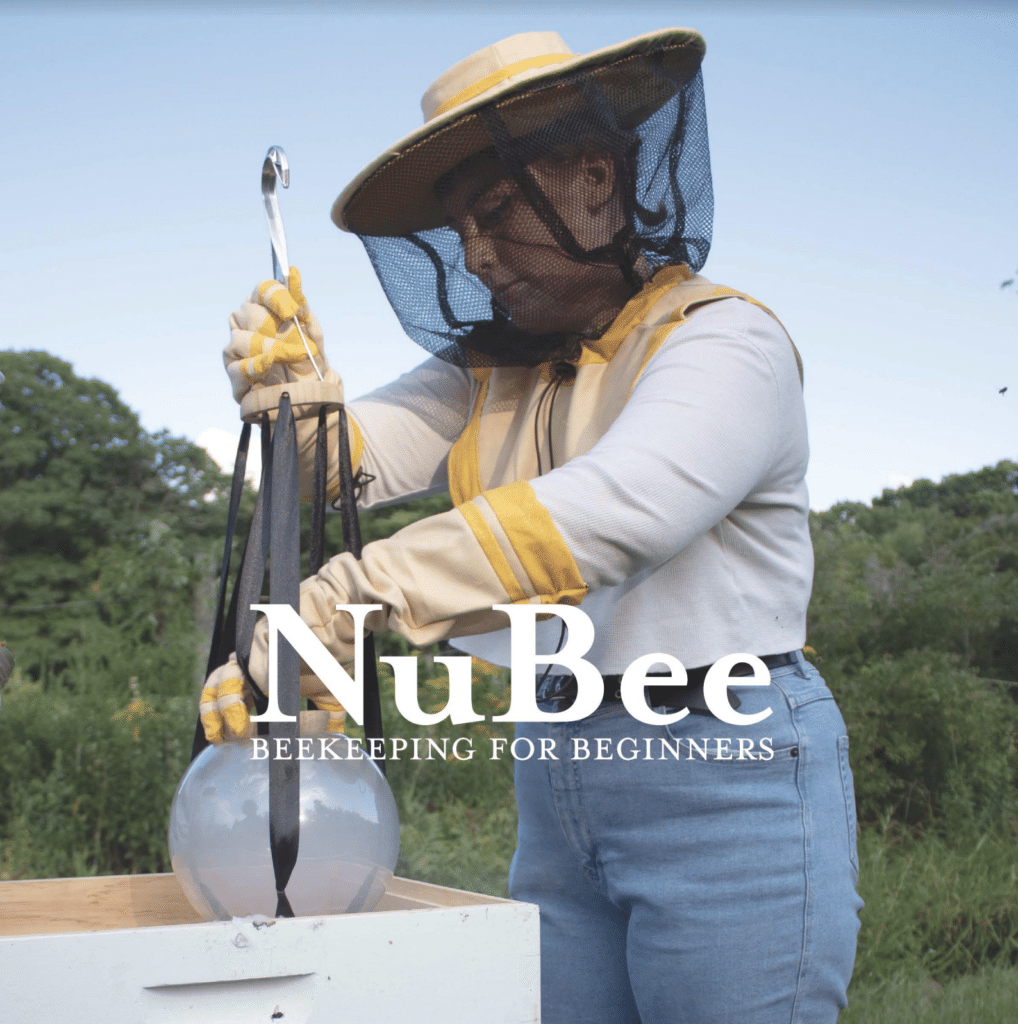
That’s incredible. What would you say is the biggest takeaway you had from your thesis?
After doing all of my research, my professor asked me a weird question. He asked, “Have you noticed anything about beekeepers?” And I was like, uh, I don’t know what you’re talking about. And he said that they’re all a little bit quirky–they’re very interesting people and they have this weird attachment and connection to the bees.
So for a while, I was thinking about it in such a tangible way, like the actual interaction with the bees through the process of beekeeping. But I wasn’t thinking about it on a really spiritual level, and I think that was something that surprised me was that there is a much deeper personal connection between beekeepers and their beehives, right?
It’s like a cat or a dog. You can compare that relationship that people have to the ones they have with bees, but I was not expecting it, because these are bugs, and I had to think about people having this emotional connection to a lot of insects.
What drew you to Best Bees in general? How did you join the team?
It’s kind of a funny story. I actually used Noah, our Chief Scientific Officer’s book for my research, but I didn’t know that at all until a week after I started working at Best Bees! I had followed their Instagram while I was doing the research for my thesis and they posted a listing for a harvesting position, but I wasn’t quite sure that I was ready to jump in as a beekeeper.
But when I applied, they said, “We don’t want you as a harvester, we want you as a beekeeper, since you know a lot about it already.” That was so cool.
Sounds like fate to us.
Yeah, I just liked the idea of a beekeeping service where I could just be out in the field beekeeping everyday and learn as much as I could. And learning rather quickly was very appealing to me, especially after COVID and being cooped up inside for a year, so I was just excited to get outside and do something hands-on.
Going back to your title as an Apiary Manager, there may be some folks here who have heard the term but don’t know exactly what it means. Could you explain to us what an apiary is, and how you manage them?
Generally, the Best Bees apiaries have anywhere between 12 to 32 hives at our largest one right now. And as an Apiary Manager, my task is to manage those hives.
So our apiary hives belong to Best Bees, and we use those bees as resources to replenish our client hives, whether it be for honey, pollen, bees, or queens– we’re able to take all of those resources from our hives, bring them to our client hives and then provide them with the things that they need.
Why is there a need for an apiary manager?
There are too many beehives in the apiaries for them to be maintained by a rotation of beekeepers. It’s difficult, but important, for just one beekeeper to understand what’s happening in all of those hives. There’s also an advantage at the apiaries where if you have a hive that doesn’t have enough honey or enough resources, then you can pull from a neighboring hive and give it to the hive with not enough.
It’s really cool to see. To go return back to these hives and see the progress that they’ve made from month to month. All of these fixes turn into solutions and it’s been really cool.
What’s your favorite part about managing apiaries?
Honestly, being surrounded by bees. Oftentimes I do need somebody to come with me because there’s just so many hives, but when I’m there by myself, I get into this different headspace where I kind of match my frequency to the bees.
It’s kind of hard to explain, but when you spend enough time with the bees, I feel like your vibrations and your energy kind of balances out with them, and you have to learn how to control your fear and be completely calm.
It’s allowed me to find this new inner peace. I feel this new, calmness and stillness where I have to be in that state of mind. That stillness with the bees is my favorite part of being there.
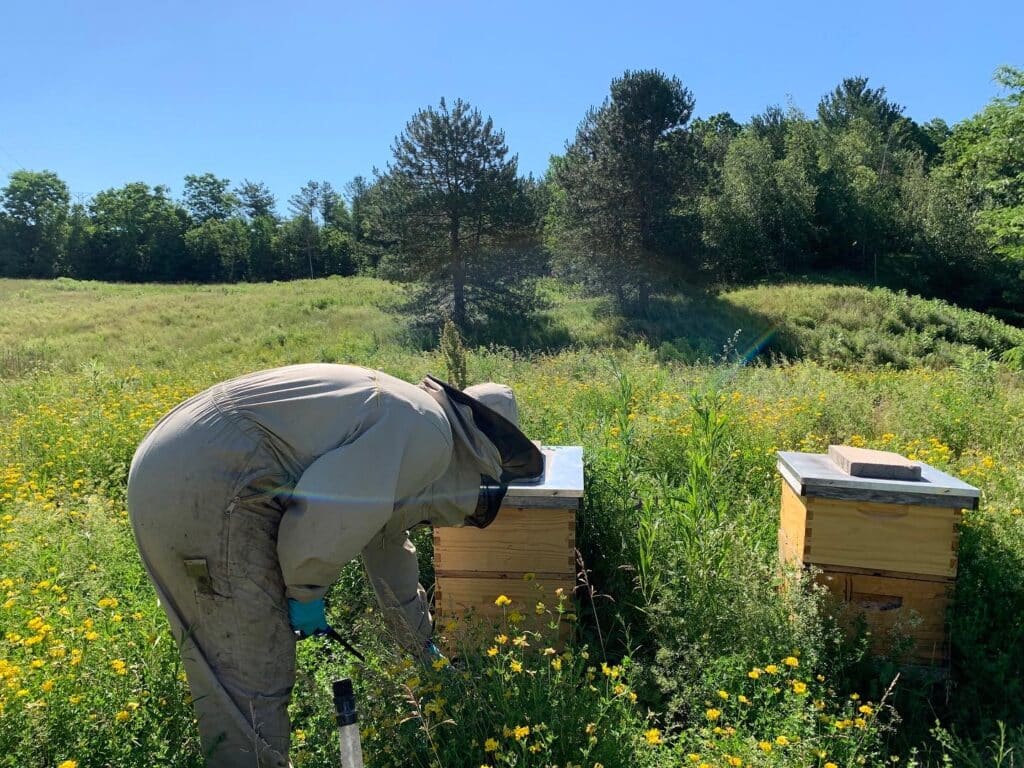
Would you rather be a queen bee, worker bee, or a drone?
I would say probably a worker because I love the idea of being on the same level as all my fellow bees.
I know that the queen is titled the queen, but she’s not actually a monarch. The worker bees are the ones that are making the decisions together. And I feel like we have a lot to learn from them because they’re all working for the common goal and for the greater good of the colony, both inside and outside of the hive, and they each have different roles.
Final question for you, and it’s a big one: What are you looking forward to most during this upcoming season?
I am looking forward to learning more. I love that I feel like I’ve learned so much already this season, but I think next season I will have the ability to combine everything that I’ve learned from this year and make some decisions that will hopefully make our apiaries run a little bit smoother next year.
Since this was my first year in the position, I now feel like I have the tools and I’ll be ready to actually actively manage the apiaries in the way that I want to. I’m also excited to get the results of our “Why Are Bees Dying?” study, so I can hopefully make some changes to the way that we are managing the hives and continue improving their health.


